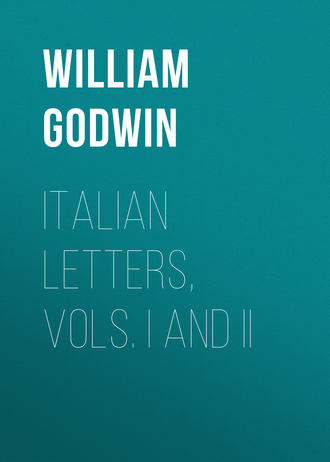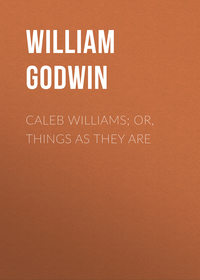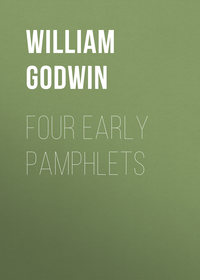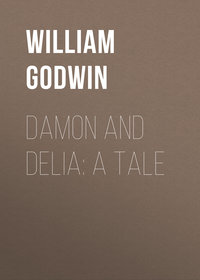 полная версия
полная версияItalian Letters, Vols. I and II

William Godwin
Italian Letters, Vols. I and II / The History of the Count de St. Julian
VOLUME I
Letter I
The Count de St. Julian to the Marquis of Pescara
Palermo
My dear lord,
It is not in conformity to those modes which fashion prescribes, that I am desirous to express to you my most sincere condolence upon the death of your worthy father. I know too well the temper of my Rinaldo to imagine, that his accession to a splendid fortune and a venerable title can fill his heart with levity, or make him forget the obligations he owed to so generous and indulgent a parent. It is not the form of sorrow that clouds his countenance. I see the honest tear of unaffected grief starting from his eye. It is not the voice of flattery, that can render him callous to the most virtuous and respectable feelings that can inform the human breast.
I remember, my lord, with the most unmingled pleasure, how fondly you used to dwell upon those instances of paternal kindness that you experienced almost before you knew yourself. I have heard you describe with how benevolent an anxiety the instructions of a father were always communicated, and with what rapture he dwelt upon the early discoveries of that elevated and generous character, by which my friend is so eminently distinguished. Never did the noble marquis refuse a single request of this son, or frustrate one of the wishes of his heart. His last prayers were offered for your prosperity, and the only thing that made him regret the stroke of death, was the anguish he felt at parting with a beloved child, upon whom all his hopes were built, and in whom all his wishes centred.
Forgive me, my friend, that I employ the liberty of that intimacy with which you have honoured me, in reminding you of circumstances, which I am not less sure that you revolve with a melancholy pleasure, than I am desirous that they should live for ever in your remembrance. That sweet susceptibility of soul which is cultivated by these affectionate recollections, is the very soil in which virtue delights to spring. Forgive me, if I sometimes assume the character of a Mentor. I would not be so grave, if the love I bear you could dispense with less.
The breast of my Rinaldo swells with a thousand virtuous sentiments. I am conscious of this, and I will not disgrace the confidence I ought to place in you. But your friend cannot but be also sensible, that you are full of the ardour of youth, that you are generous and unsuspecting, and that the happy gaiety of your disposition sometimes engages you with associates, that would abuse your confidence and betray your honour.
Remember, my dear lord, that you have the reputation of a long list of ancestors to sustain. Your house has been the support of the throne, and the boast of Italy. You are not placed in an obscure station, where little would be expected from you, and little would be the disappointment, though you should act in an imprudent or a vicious manner. The antiquity of your house fixes the eyes of your countrymen upon you. Your accession at so early a period to its honours and its emoluments, renders your situation particularly critical.
But if your situation be critical, you have also many advantages, to balance the temptations you may be called to encounter. Heaven has blessed you with an understanding solid, judicious, and penetrating. You cannot long be made the dupe of artifice, you are not to be misled by the sophistry of vice. But you have received from the hands of the munificent creator a much more valuable gift than even this, a manly and a generous mind. I have been witness to many such benevolent acts of my Rinaldo as have made my fond heart overflow with rapture. I have traced his goodness to its hiding place. I have discovered instances of his tenderness and charity, that were intended to be invisible to every human eye.
I am fully satisfied that the marquis of Pescara can never rank among the votaries of vice and folly. It is not against the greater instances of criminality that I wish to guard you. I am not apprehensive of a sudden and a total degeneracy. But remember, my lord, you will, from your situation, be inevitably surrounded with flatterers. You are naturally fond of commendation. Do not let this generous instinct be the means of disgracing you. You will have many servile parasites, who will endeavour, by inuring you to scenes of luxury and dissipation, to divert your charity from its noblest and its truest ends, into the means of supporting them in their fawning dependence. Naples is not destitute of a set of young noblemen, the disgrace of the titles they wear, who would be too happy to seduce the representative of the marquisses of Pescara into an imitation of their vices, and to screen their follies under so brilliant and conspicuous an example.
My lord, there is no misfortune that I more sincerely regret than the loss of your society. I know not how it is, and I would willingly attribute it to the improper fastidiousness of my disposition, that I can find few characters in the university of Palermo, capable of interesting my heart. With my Rinaldo I was early, and have been long united; and I trust, that no force, but that of death, will be able to dissolve the ties that bind us. Wherever you are, the heart of your St. Julian is with you. Wherever you go, his best wishes accompany you. If in this letter, I have assumed an unbecoming austerity, your lordship will believe that it is the genuine effusion of anxiety and friendship, and will pardon me. It is not that I am more exempt from youthful folly than others. Born with a heart too susceptible for my peace, I am continually guilty of irregularities, that I immediately wish, but am unable to retract. But friendship, in however frail a bosom she resides, cannot permit her own follies to dispense her from guarding those she loves against committing their characters.
Letter II
The Answer
Naples
It is not necessary for me to assure my St. Julian, that I really felt those sentiments of filial sorrow which he ascribes to me. Never did any son sustain the loss of so indulgent a father. I have nothing by which to remember him, but acts of goodness and favour; not one hour of peevishness, not one instance of severity. Over all my youthful follies he cast the veil of kindness. All my imaginary wants received a prompt supply. Every promise of spirit and sensibility I was supposed to discover, was cherished with an anxious and unremitting care.
But such as he was to me, he was, in a less degree, to all his domestics, and all his dependents. You can scarcely imagine what a moving picture my palace—and must I call it mine? presented, upon my first arrival. The old steward, and the grey-headed lacqueys endeavoured to assume a look of complacency, but their recent grief appeared through their unpractised hypocrisy. "Health to our young master! Long life," cried they, with a broken and tremulous accent, "to the marquis of Pescara!" You will readily believe, that I made haste to free them from their restraint, and to assure them that the more they lamented my ever honoured father, the more they would endear themselves to me. Their looks thanked me, they clasped their hands with delight, and were silent.
The next morning as soon as I appeared, I perceived, as I passed along, a whole crowd of people plainly, but decently habited, in the hall. "Who are they?" said I. "I endeavoured to keep them off," said the old steward, "but they would not be hindered. They said they were sure that the young marquis would not bely the bounty of their old master, upon which they had so long depended for the conveniences and comfort of life." "And they shall not be kept off," said I; and advancing towards them, I endeavoured to convince them, that, however unworthy of his succession, I would endeavour to keep alive the spirit of their benefactor, and would leave them as little reason as possible to regret his loss. Oh! my St. Julian, who but must mourn so excellent a parent, so amiable, so incomparable a man!
But you talked to me of the flattering change in my situation. And shall I confess to you the truth? I find nothing in it that flatters, nothing that pleases me. I am told my revenues are more extensive. But what is that to me? They were before sufficiently ample, and I had but to wish at any time, in order to have them increased. But I am removed to the metropolis of the kingdom, to the city in which the court of my master resides, to the seat of elegance and pleasure. And yet, amidst all that it offers, I sigh for the rural haunts of Palermo, its pleasant hills, its fruitful vales, its simplicity and innocence. I sit down to a more sumptuous table, I am surrounded with a more numerous train of servants and dependents. But this comes not home to the heart of your Rinaldo. I look in vain through all the circle for an equal and a friend. It is true, when I repair to the levee of my prince, I behold many equals; but they are strangers to me, their faces are dressed in studied smiles, they appear all suppleness, complaisance and courtliness. A countenance, fraught with art, and that carries nothing of the soul in it, is uninteresting, and even forbidding in my eye.
Oh! how long shall I be separated from my St. Julian? I am almost angry with you for apologizing for your kind monitions and generous advice. If my breast glows with any noble sentiments, it is to your friendship I ascribe them. If I have avoided any of the rocks upon which heedless youth is apt to split, yours is all the honour, though mine be the advantage. More than one instance do I recollect with unfeigned gratitude, in which I had passed the threshold of error, in which I had already set my foot upon the edge of the precipice, and was reclaimed by your care. But what temptations could the simple Palermo offer, compared with the rich, the luxurious, and dissipated court of Naples?
And upon this scene I am cast without a friend. My honoured father indeed could not have been my companion, but his advice might have been useful to me in a thousand instances. My St. Julian is at a distance that my heart yearns to think of. Volcanos burn, and cataracts roar between us. With caution then will I endeavour to tread the giddy circle. Since I must, however unprepared, be my own master, I will endeavour to be collected, sober, and determined.
One expedient I have thought of, which I hope will be of service to me in the new scene upon which I am to enter. I will think how my friend would have acted, I will think that his eye is upon me, and I will make it a law to myself to confess all my faults and follies to you. As you have indulged me with your correspondence, you will allow me, I doubt not, in this liberty, and will favour me from time to time with those honest and unbiassed remarks upon my conduct, which it is consonant with your character to make.
Letter III
The Same to the Same
Naples
Since I wrote last to my dear count, I have been somewhat more in public, and have engaged a little in the societies of this city. You can scarcely imagine, my friend, how different the young gentlemen of Naples are from my former associates in the university. You would hardly suppose them of the same species. In Palermo, almost every man was cold, uncivil and inattentive; and seemed to have no other purpose in view than his own pleasure and accommodation. At Naples they are all good nature and friendship. Your wishes, before you have time to express them, are forestalled by the politeness of your companions, and each seems to prefer the convenience and happiness of another to his own.
With one young nobleman I am particularly pleased, and have chosen him from the rest as my most intimate associate. It is the marquis of San Severino. I shall endeavour by his friendship, as well as I can, to make up to myself the loss of my St. Julian, of whose society I am irremediably deprived. He does not indeed possess your abilities, he has not the same masculine understanding, and the same delightful imagination. But he supplies the place of these by an uninterrupted flow of good humour. All his passions seem to be disinterested, and it would do violence to every sentiment of his heart to be the author of a moment's pain to another.
Do not however imagine, my dear count, that my partiality to this amiable young nobleman renders me insensible to the defects of his character. Though his temper be all sweetness and gentleness, his views are not the most extensive. He considers much more the present ease of those about him, than their future happiness. He has not harshness, he has not firmness enough in his character, shall I call it? to refuse almost any request, however injudicious. He is therefore often led into improper situations, and his reputation frequently suffers in a manner that I am persuaded his heart does not deserve.
The person of San Severino is tall, elegant and graceful. His manners are singularly polite, and uniformly unembarassed. His voice is melodious, and he is eminently endowed by nature with the gift of eloquence. A person of your penetration will therefore readily imagine, that his society is courted by the fair. His propensity to the tender passion appears to have been very great, and he of consequence lays himself out in a gallantry that I can by no means approve.
Such, my dear count, appears to me to be the genuine and impartial character of my new friend. His good nature, his benevolence, and the pliableness of his disposition may surely be allowed to compensate for many defects. He can indeed by no means supply the place of my St. Julian. I cannot look up to him as a guide, and I believe I shall never be weak enough to ask his advice in the conduct of my life.
But do not imagine, my dear lord, that I shall be in much danger of being misled by him into criminal irregularities. I feel a firmness of resolution, and an ardour in the cause of virtue, that will, I trust, be abundantly sufficient to set these poor temptations at defiance. The world, before I entered it, appeared to me more formidable than it really is. I had filled it with the bugbears of a wild imagination. I had supposed that mankind made it their business to prey upon each other. Pardon me, my amiable friend, if I take the liberty to say, that my St. Julian was more suspicious than he needed to have been, when he supposed that Naples could deprive me of the simplicity and innocence that grew up in my breast under his fostering hand at Palermo.
Letter IV
The Count de St. Julian to the Marquis of Pescara
Palermo
I rejoice with you sincerely upon the pleasures you begin to find in the city of Naples. May all the days of my Rinaldo be happy, and all his paths be strewed with flowers! It would have been truly to be lamented, that melancholy should have preyed upon a person so young and so distinguished by fortune, or that you should have sighed amidst all the magnificence of Naples for the uncultivated plainness of Palermo. So long as I reside here, your absence will constantly make me feel an uneasy void, but it is my earnest wish that not a particle of that uneasiness may reach my friend.
Surely, my dear marquis, there are few correspondents so young as myself, and who address a personage so distinguished as you, that deal with so much honest simplicity, and devote so large a share of their communications to the forbidding seriousness of advice. But you have accepted the first effort of my friendship with generosity and candour, and you will, I doubt not, continue to behold my sincerity with a favourable eye.
Shall I venture to say that I am sorry you have commenced so intimate a connexion with the marquis of San Severino? Even the character of him with which you have favoured me, represents him to my wary sight as too agreeable not to be dangerous. But I have heard of him from others, a much more unpleasing account.
Alas, my friend, under how fair an outside are the most pernicious principles often concealed! Your honest heart would not suspect, that an appearance of politeness frequently covers the most rooted selfishness. The man who is all gentleness and compliance abroad, is often a tyrant among his domestics. The attendants upon a court put on their faces as they put on their clothes. And it is only after a very long acquaintance, after having observed them in their most unguarded hours, that you can make the smallest discovery of their real characters. Remember, my dear Rinaldo, the maxim of the incomparable philosopher of Geneva: "Man is not naturally amiable." If the human character shews less pleasing and attractive in the obscurity of retreat, and among the unfinished personages of a college, believe me, the natives of a court are not a whit more disinterested, or have more of the reality of friendship. The true difference is, that the one wears a disguise, and the other appear as they are.
I do not mean however to impute all the faults I have mentioned to the marquis of San Severino. He is probably in the vulgar sense of the word good-natured. As you have already expressed it, he knows not how to refuse the requests, or contradict the present inclinations of those with whom he is connected. You say rightly that his gallantries are such as you can by no means approve. He is, if I am not greatly misinformed, in the utmost degree loose and debauched in his principles. The greater part of his time is spent in the haunts of intemperance, and under the roofs of the courtezan. I am afraid indeed he has gone farther than this, and that he has not scrupled to ruin innocence, and practise all the arts of seduction.
There is, my dear Rinaldo, a species of careless and youthful vice, that assumes the appearance of gentleness, and wears the garb of generosity. It even pretends to the name of virtue. But it casts down all the sacred barriers of religion. It laughs to scorn that suspicious vigilance, that trembling sensibility, that is the very characteristic of virtue. It represents those faults of which a man may be guilty without malignity, as innocent. And it endeavours to appropriate to itself all comprehensiveness of view, all true fortitude, and all liberal generosity.
Believe me, my friend, this is the enemy from which you have most to fear. It is not barefaced degeneracy that can seduce you. She must be introduced under a specious name, she must disguise herself like something that nature taught us to approve, and she must steal away the heart at unawares.
Letter V
The Answer
Naples
I can never sufficiently acknowledge the friendship that appears in every line of your obliging epistles. Even where your attachment is rouzed without a sufficient cause, it is only upon that account the more conspicuous.
I took the liberty, my dear count, immediately after receiving your last, to come to an explanation with San Severino. I mentioned to him the circumstances in your letter, as affairs that had been casually hinted to me. I told him, that I was persuaded he would excuse my freedom, as I was certain there was some misinformation, and I could not omit the opportunity of putting it in his power to justify himself. The marquis expressed the utmost astonishment, and vowed by all that was sacred, that he was innocent of the most important part of the charge. He told me, that it was his ill fortune, and he supposed he was not singular, to have enemies, that made it their business to misrepresent every circumstance of his conduct. He had been calumniated, cruelly calumniated, and could he discover the author of the aspersion, he would vindicate his honour with his sword. In fine, he explained the whole business in such a manner, as, though I could not entirely approve, yet evinced it to be by no means subversive of the general amiableness of his character. How deplorable is the situation in which we are placed, when even the generous and candid temper of my St. Julian, can be induced to think of a young nobleman in a light he does not deserve, and to impute to him basenesses from which his heart is free!
Soon after this interview I was introduced by my new friend into a society of a more mixed and equivocal kind than I had yet seen. Do not however impute to the marquis a surprize of which he was not guilty. He fairly stated to me of what persons the company was to be composed; and idle curiosity, and perhaps a particular gaiety of humour, under the influence of which I then was, induced me to accept of his invitation. If I did wrong, my dear count, blame me, and blame me without reserve. But if I may judge from the disposition in which I left this house, I only derived a new reinforcement to those resolutions, with which your conversation and example first inspired me.
It was in the evening, after the opera. The company was composed of several of our young nobility, and an equal number of female performers and other ladies of the same reputation. They almost immediately broke into tête-à-têtes, and of consequence one of the ladies addressed herself particularly to me. The vulgar familiarity of her manners, and the undisguised libidinousness of her conversation, I must own, disgusted me. Though I do not pretend to be devoid of the passions incident to my age, I was not at all pleased with the addresses of this female. As my companions were more active in the choice of an associate, it may perhaps be only candid to own, that she was not the most pleasing in the circle. The consciousness of the eyes of the whole party embarrassed me. And the aukward attempts I made to detach myself from my enamorata, as they proved unsuccessful, so they served to excite a general smile. San Severino however presently perceived my situation, and observing that I was by no means satisfied with my fortune, he with the utmost politeness broke away from the company, and attended me home.
How is it my dear friend that vice, whose property it should seem to be, to hesitate and to tremble, should be able to assume this air of confidence and composure? How is it that innocence, that surely should always triumph, is thus liable to all the confusion and perplexity of guilt? Why is virtue chosen, but because she is the parent of honour, because she enables a man to look in the face the aspersions of calumny, and to remain firm and undejected, amidst whatever fortune has of adverse and capricious? And are these advantages merely imaginary? Are composure and self-approbation common to the upright and the wicked? Or do those who are most hardened, really possess the superiority; and can conscious guilt bid defiance to shame, while rectitude is continually liable to hide her head in confusion?
Letter VI
The Same to the Same
Naples
You will recollect, my St. Julian, that I promised to confess to you my faults and my follies, and to take you for the umpire and director of my conduct. Perhaps I have done wrong. Perhaps, though unconscious of error, I am some how or other misled, and need your faithful hand to lead me back again to the road of integrity.
Why is it that I feel a reluctance to state to you the whole of my conduct? It is a sensation to which I have hitherto been a stranger, and in spite of me, it obliges me to mistrust myself. But I have discovered the reason. It is, that educated in solitude, and immured in the walls of a college, we had not learned to make allowances for the situations and the passions of mankind. You and I, my dear count, have long agreed, that the morality of priests is to be distrusted: that it is too often founded upon sinister views and private interest: that it has none of that comprehension of thought, that manly enthusiasm, which is characteristic of the genuine moral philosopher. What have penances and pilgrimages, what have beads and crosses, vows made in opposition to every instinct of nature, and an obedience subversive of the original independency of the human mind, to do with virtue?
Thus far, my amiable friend, you advanced, but yet I am afraid you have not advanced far enough. I am told there is an honesty and an honour, that preserves a man's character free from impeachment, which is perfectly separate from that sublime goodness that you and I have always admired. But to this sentiment I am by no means reconciled. To speak more immediately to the subject I intended.











